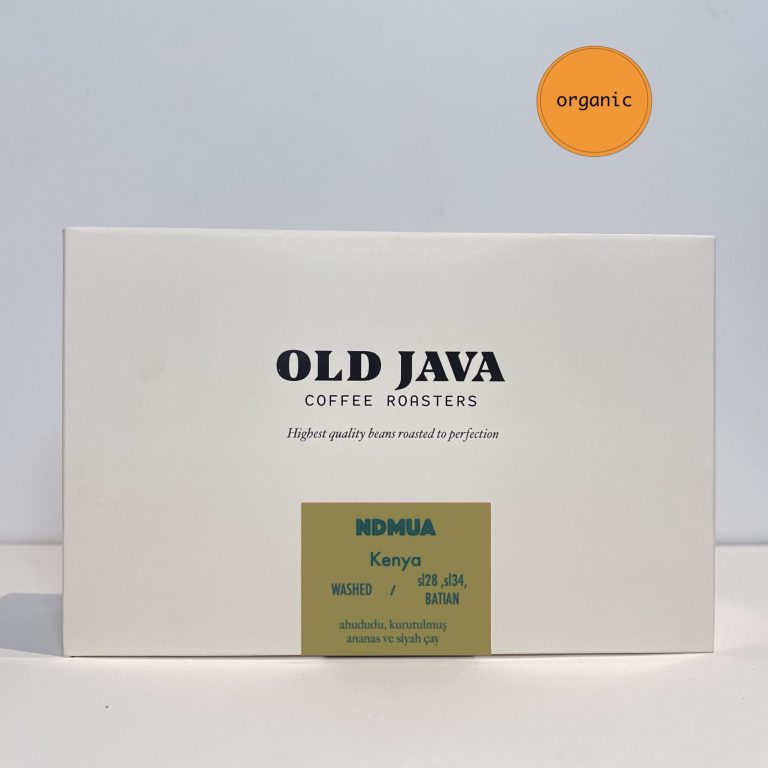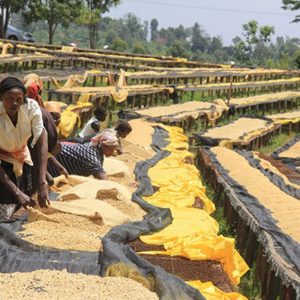Special Discount in Cart 10%
Kenya / Nduma
£15.50 – £55.00

250 g
Filter Recommendation
Tasting This coffee is located in the Nyeri region, on the western slopes of Mount Kenya (5199 m), the highest mountain in the country. Due to its altitude (farms are located between 1280 – 1970 m.a.s.l.), fertile red volcanic soils and tropical climate, the coffee from Nyeri is considered to be some of the best in Kenya and the entire region is called the “Champagne Region of Coffee”. Raspberry, lemon, dried pineapple, black tea, complex balanced acidity and deep sweetness… This coffee has a truly intriguing aroma complex that gives a long-lasting sweet finish on the palate.
Production Nduma station is located in the heart of Neyri and is one of 7 factories run by the Ruthaka farmers’ cooperative.
lot 12-23-20ORIGIN: VARIOUS FARMS FROM NYERI REGION
Detail
| Region | Nyrei |
| Altitude | 1400 m |
| Process | washed |
| Variety | sl24 ,sl28 ve Batian |
| Score | 84 |
The vast majority of coffee traded in Kenya is bought and sold through the national auction system, where marketers enter the coffee from cooperatives and farms and traders come to bid.
The main buyers of this auction system are large multinational corporations, who then offer the lots to importers and roasters. Unfortunately, for a long time this was the only way to buy Kenyan coffee, and the lack of transparency has led to poor service and price volatility.
Over the last few years, local Kenyan companies have become more common, opening the way for direct purchases through auctions.
This was not only a conscious decision to support local businesses in Kenya, but also to make the supply chain more efficient and save money, thus passing these savings on to the producers.

The Nduma factory is located in Nyeri on the southern slopes of Mount Kenya and is part of the Rumukia Farmers’ Cooperative.
The Nduma factories are run by a large group of local Kikuyu who regularly send cherries to the factory in November, December and January, with around 1,200 smallholder farmers contributing to the annual production.
The factory is built right next to the Tana River and the area where the coffee is grown is healthier, with rich volcanic sand soils and abundant vegetation covering the entire valley.
Nduma means “Dark” in the Kikuyu language and the name was chosen because in ancient times the area was covered with dense forests where almost no sunlight could penetrate, making it very difficult to cross the land.
The soils are rich in nutrients and farmers grow many other crops besides coffee, allowing the local population to diversify and produce multiple crops throughout the year, increasing their total household income and becoming united, independent and economically together.
Quality Varietal Arabica Series
*SL28 was selected at the former Scott Agricultural Laboratories (now the National Agricultural Laboratories, NARL, in Kabete – more below). SL28 is one of the best known and most appreciated varieties in Africa. As a result, it has spread from Kenya, where it was first selected in the 1930s, to other parts of Africa (especially important in the Arabica growing regions of Uganda) and now to Latin America. This variety has great drought tolerance and very good cup quality potential, but is sensitive to large storage.
*SL34 was first selected at the Scott Agricultural Laboratories in Kenya in the late 1930s. Individual tree selections made at the Scott Laboratories in Kenya during the period 1935-1939 are marked with the prefix “SL”. SL34 was selected from a single tree at the Loresho Estate in Kabete. The initial quality of this variety is exceptional, but the coffee fruit is sensitive to person.
*Batian is a composite variety that mixes three different pure hat varieties. The varieties included in the original crosses are: SL28, SL34, Rume Sudan, N39, K7), SL4 and Timor Hybrid. A variety resistant to coffee leaf bacon and coffee berry was developed at the Coffee Research Station (CRS; now Coffee Research Institute, CRI) in Ruiru, Kenya. Batian was released in Kenya in 2010. (Source: worldcoffeeresearch.org)
SL 34, SL28 and Batain Varieties Washing Process Details
1. Delivery of Coffee Berry: Coffee Berry (or cherry) is manually sorted by farmers into immature and overripe before production. The deliveries from different farmers are processed together. A disk pulper removes the husk and pulp.
2. Classification Coffees are divided into 3 classes according to the dispersion of the pulpers. Class 1 and 2 go to fermentation separately. Class 3 is considered low class. Coffee is fermented in closed shade for 16-24 hours. After fermentation, the coffees are washed and re-sorted according to their distribution in the washing channels and then kept under clean water from a stream for 16-18 hours.
3. Drying: They are dried in the sun for 8-14 days in African drying beds. The coffees are covered with plastic during the afternoon and night hours.
WHY COFFEE SUBSCRIPTION?
With subscription, we send 2 different coffees to your address at any time you want, every month.
We constantly update our very special coffee collection from different coffee geographies of the world and always have fresh harvest coffees.
There is also a store delivery option in subscriptions! Would you like to get more discounts with this option?
Decide on SUBSCRIPTION products, then we will reach you immediately!
Our order team will fulfill your request as soon as possible.
.
